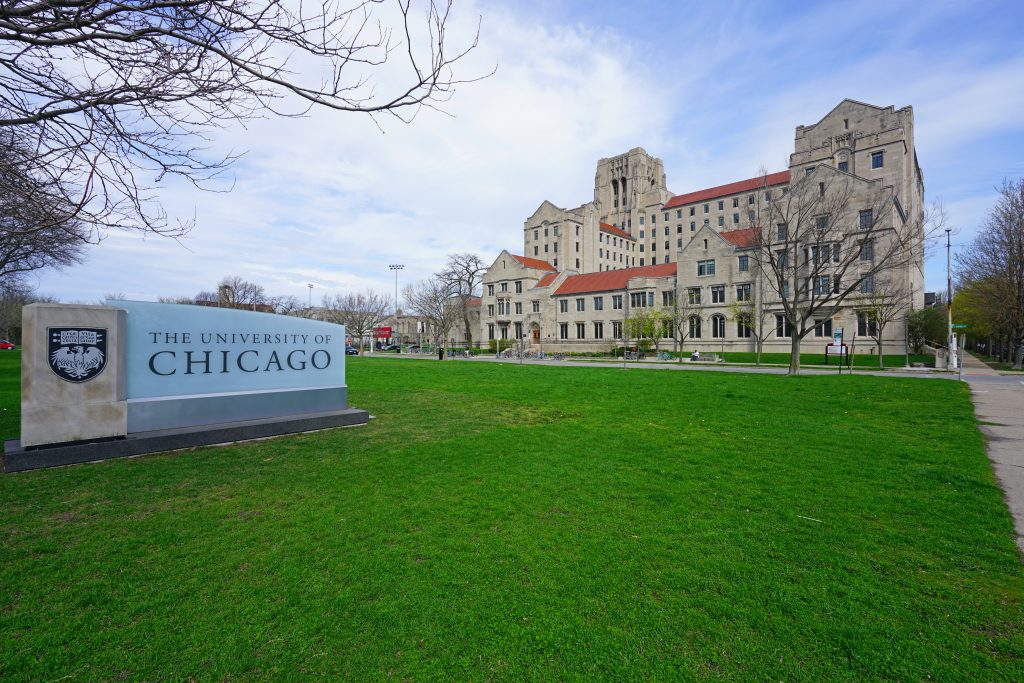I was far from being a good student until my last year of high school.
My grades prevented me from being admitted to the University of Chicago or any of my other top-choice schools in the U.S. But this year, I applied again as a transfer student and was accepted.
As a result, I came to understand the difference between rejection and acceptance.

View of the Gothic campus of the University of Chicago (EQRoy/Shutterstock.com)
In the college application process, the three most important elements are grades, activities, and essays. Each one should tell an interesting story about you.
Grades
Good grades are a prerequisite to getting into most colleges; many applicants have near-perfect grades all through high school since college admissions are so competitive today.
But don’t worry if your grades aren’t perfect. An applicant who shows growth can be just as competitive as one with stellar grades. Such was my situation: I had weak grades for the first three years of high school and then in my last year I earned near-perfect grades. So, the focus of my successful application and essays was my growth and self-reflection.
Activities
Activities define applicants beyond the numbers on their transcript. Your activities can be anything—as long as you demonstrate a long-term commitment to your passion. If you want to become an academic, you can do research at a local university and publish a paper. If you see beauty in numbers, you can strive to win a gold medal at the International Mathematics Olympiad. If you have an entrepreneurial spirit, you can start a business or non-profit organization.
In my first application, I did not take my activities list seriously. Some of my descriptions of activities were vague, and I excluded some activities that I thought were irrelevant or unimpressive. That was a mistake; colleges want a detailed picture of what you’ve done outside the classroom.
My successful application embraced the different aspects of my personality. One of the activities I listed—achieving a martial arts black belt—was common, as many parents push their kids to do this. But I took it further by accomplishing a one-armed, two-finger push-up. Such a feat—taking a year of daily practice—demonstrated my long-term commitment and revealed genuine interest in unarmed combat training. Another activity I listed was an art: I mastered a 19th-century penmanship technique for which I learned to handwrite with arm instead of wrist movement. This rare technique also required hundreds of hours of practice, which the University of Chicago likely found interesting.
But the passion I most wanted to stress in my application was writing. I published a book on Amazon that described my transformation as a student and explained the difference between a good and a poor student. By showcasing the book in my application, I was also able to articulate the story behind my grades.
Essays
The most important part of the application is the essays. They turn an “application” into an “applicant.”
More than anything, your essays must tell a genuine story.
My 2020 and 2021 University of Chicago application essays differed starkly. The rejected essay felt forced and shallow, while the accepted essay was focused and unique.
To write a great essay explaining why you want to attend a certain university, it’s important to do research and find a single idea about the school that you can link to your own experience or character. My successful essay focused on the idea that the University of Chicago always challenges current knowledge. I connected that to my appreciation of books and lectures by the school’s professors I had read and watched online that made me question my own knowledge.
The rest of your essays—the personal statement and essays about your extracurriculars and personality—should convey initiative and intellectual curiosity. Your good grades and high test scores have already shown colleges that you’re hardworking and determined. I incorrectly emphasized my academic performance in my first application rather than telling colleges something they didn’t know—that I loved learning.

Dragon Images/Shutterstock.com
The college application process, especially in the U.S., can be tricky. The colleges are in the business of assessing human potential, which will always be imperfect. In other words, some luck is involved.
If you do not get into the college of your choice, don’t fret. You’re bound to find the school that’s right for you if you keep your options open and be honest with yourself throughout the application process. You can also do what I did and try again as a transfer student.
Remember, an admissions decision does not define your potential. You do.







COMMENTS0
LEAVE A COMMENT
TOP